Vegan Substitutes: A Beginner’s Guide

March 1, 2019
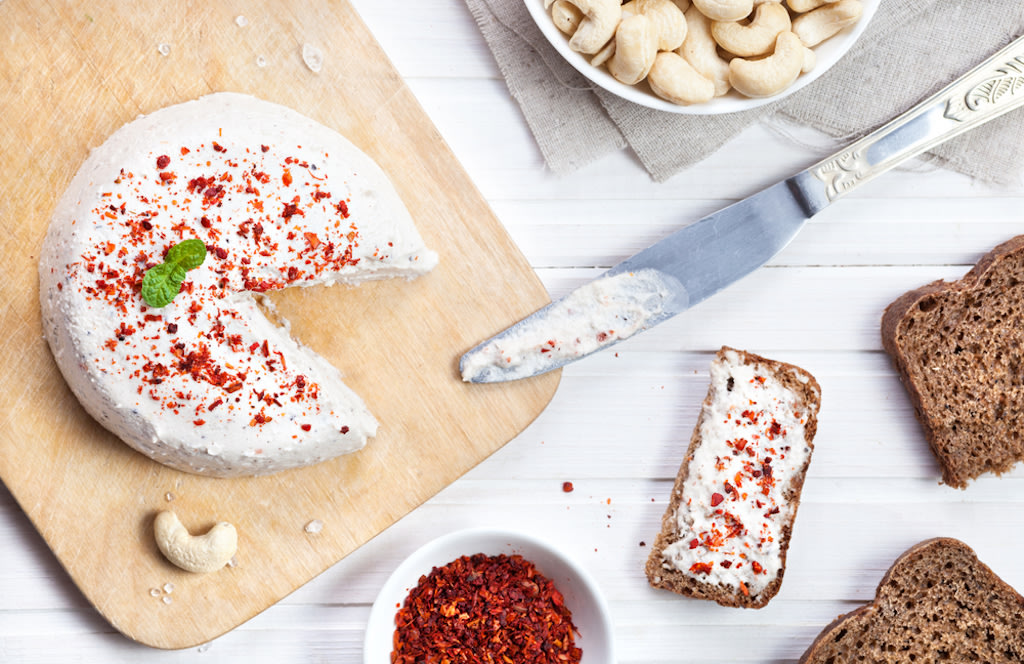
Maintaining a healthy diet isn’t always easy — and if you’re someone with special dietary preferences or restrictions, you will probably agree that avoiding certain food groups can add an extra layer of difficulty in the effort to make consistently healthy choices and live a lifestyle that prioritises being healthy.
No matter what your reasons are for being dairy-free, there are so many tasty and nutritious vegan substitutes that you can make — it’s just about making informed choices.
Keeping this in mind, it can be hard to decide which substitute is best for you and your health, while also ensuring you are getting the nutrients you need from a vegan or dairy-free diet.
That’s why we’re here to help! Keep reading to learn about the healthy vegan substitutes for dairy that will complement the meals you make.
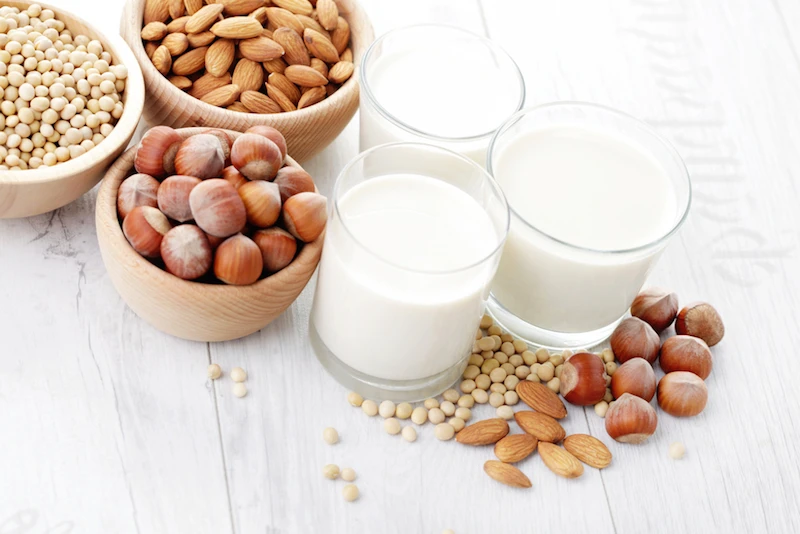
Finding vegan substitutes for dairy
The Australian Guide to Healthy Eating includes five food groups which ensure we are receiving the right amount of nutrients to nourish our bodies and to help prevent disease and ill health. The dairy food group in particular is important because it provides a range of essential nutrients including protein, carbohydrate, fat and micronutrients.
However, dairy is best known for providing calcium, a mineral necessary for the development and maintenance of bone health. When we don’t get enough calcium in our diet, we may increase our chances of developing osteoporosis and bone fracture.
Some common issues that may occur if you are removing dairy from your diet include:
Low calcium intake
Calcium requirements vary depending on each individual’s circumstances and needs. Generally, the recommended daily intake for women aged 19-30 years old in Australia is 1000mg per day — however, this increases if you are older, pregnant or breastfeeding.
If you want to reach your calcium intake without dairy, it can require more thought since dairy-free foods tend to contain smaller amounts of calcium.
Getting enough calcium using vegan substitutes
Choose meals that contain other sources of calcium. This could mean adding some calcium-rich ingredients like almonds, spinach or tofu, seeds or nuts.
Eat larger portions of foods that naturally contain calcium, such as tofu, soy, spinach, legumes and chia seeds.
Choose dairy substitutes that are fortified (this means foods that have calcium added).
Eat a wide variety of foods from all food groups; incorporating many colours in your meals can help to ensure you receive the essential vitamins and minerals you need.
It’s always best to get your nutrients from whole foods; however, if you are still worried about your calcium intake when eating vegan substitutes, then you might need to consider supplements. Talk to your health care professional as they can help you determine the best steps.
Lower protein intake
Dairy can be a great source of protein. When transitioning to a dairy-free diet, many of the dairy substitutes available tend to be much lower in protein. Ensuring your diet contains vegan substitutes for protein from plant-based sources like nuts, seeds, soy, tofu or tempeh is important. These foods also contain other essential nutrients required for good health.
Added sugars
When avoiding dairy, sometimes it can be easy to mistakenly replace it with less nutritious foods. One important thing to note is that, like any food product, dairy-free vegan substitutes may contain added sugar. While you wouldn’t expect sugar to be an ingredient in something savoury, like cheese, it can often be used to improve the flavour profile. It’s best to choose unsweetened or lower sugar versions if you are being mindful of your intake (less than 5g of sugar per 100g is recommended).
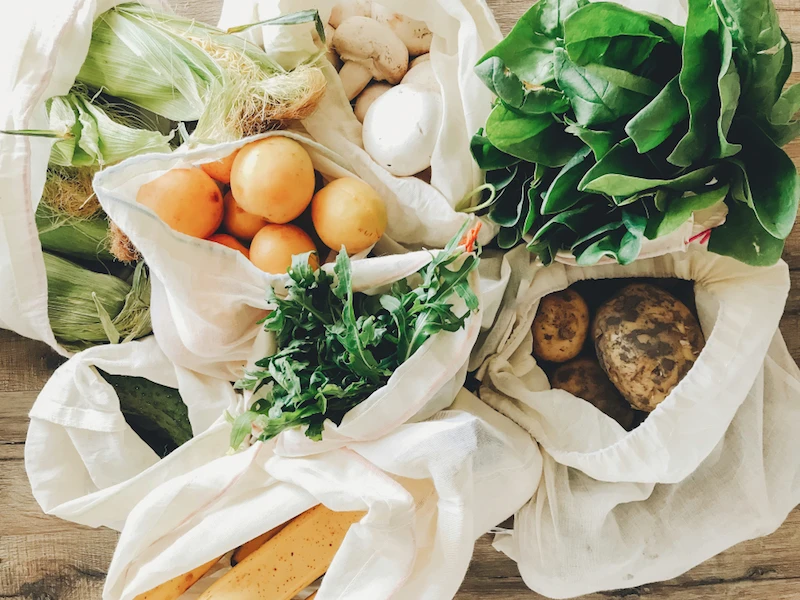
Vegan substitutes to make when shopping
While eating dairy foods is a common and easy way to add calcium, protein and other essential nutrients to your diet, we can obtain the same amount of these nutrients from vegan substitutes — although it does take a little more planning! So if you are already dairy-free or are looking for vegan substitutes in the future, you can still reach your recommended intake as long as your diet as a whole contains a wide variety of nutrient-rich foods.
These vegan substitutes can either be store-bought or made at home, depending on your needs.
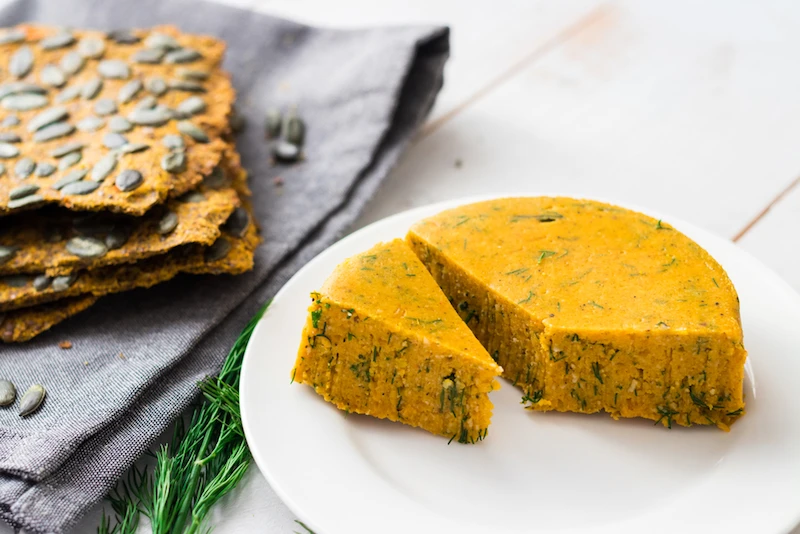
Vegan cheese alternatives
In most grocery stores, you can purchase a huge variety of vegan cheese alternatives that not only taste like cheese but act like cheese (they melt, shred and slice)! You can also try making your own cheese at home using nuts or tofu. There are hundreds of great recipes online if you’re interested in experimenting with making your own cheese like delicious raw pumpkin cheesecake recipe. Otherwise, you can also try some of these alternatives to dairy cheese:
Vegan mozzarella: in blocks, shredded or sliced (these are generally soy or coconut-based)
Cashew cheese
Tofu cream cheese or ricotta cheese: these are a higher calcium option
Nutritional yeast: also known as a form of inactivated yeast. These little flakes can be sprinkled on or added to any recipe to give a cheese-like flavour. It’s also usually fortified with B vitamins which is an added bonus. They’re great for adding to homemade nut cheeses, pasta sauces or dressings.
Vegan alternatives in the soy or tofu variety tend to be higher in calcium and lower in fat, compared to coconut or nut-based cheese. This is due to coconut and nuts being naturally higher in saturated fat, therefore they have a higher energy value.
When choosing vegan substitutes for cheese, always consider the nutrition label if you are concerned about your energy intake or fat and sodium consumption.
For lower fat/lower calorie alternatives: look for foods that have less than 10g of fat per 100g.
For lower sodium alternatives, look for foods that have less than 400 mg per 100g, or try nutritional yeast which is naturally low in sodium.
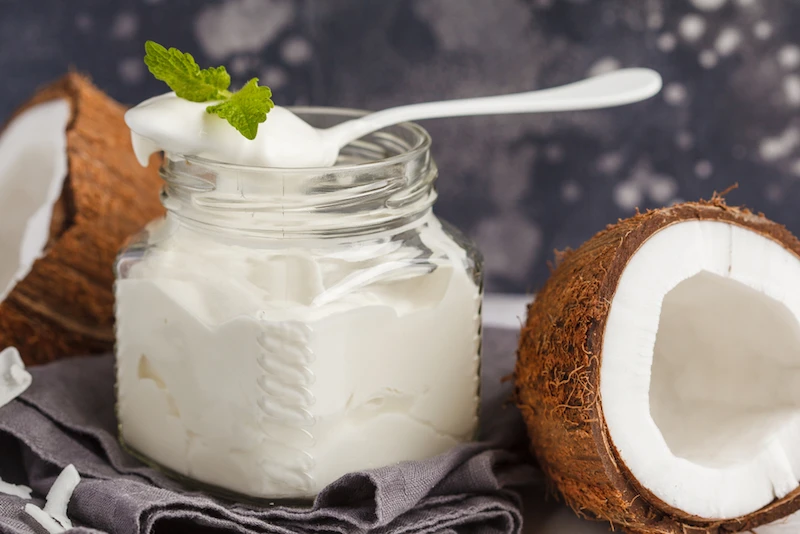
Vegan yoghurt alternatives
There are so many vegan substitutes for yoghurt available now that it can become confusing and make it difficult to know which type of yoghurt to choose!
Traditionally, yoghurt is made by combining cow’s milk with friendly bacteria and letting it culture. Friendly bacteria, or probiotics, balance out the unhealthy bacteria in your body that can cause gut issues, so yoghurt can be a great addition to any diet.
Dairy-free yoghurts can be made from almonds, coconut or cashews. As with vegan cheese alternatives, the nutritional content can vary from product to product so always check the labels and choose unsweetened versions where possible. If in doubt, choose a soy or tofu-based yoghurt as these contain higher amounts of calcium with lower levels of fat and sodium.
Some vegan substitutes for yoghurt can include:
Soy yoghurt: this is generally considered a higher calcium option
Cashew yoghurt
Almond milk yoghurt
Coconut yoghurt: generally, it is higher in saturated fat than other types of dairy-free yoghurt
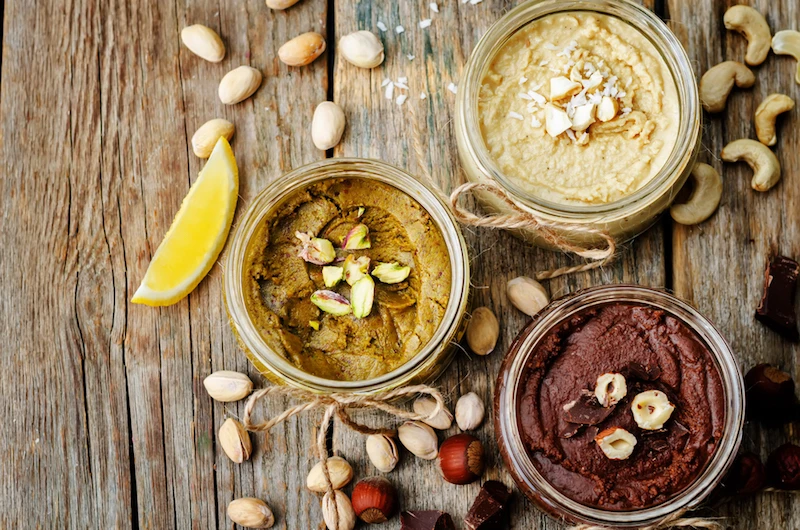
Vegan butter alternatives
As with dairy butters, it’s best to use small portions of these vegan substitutes as they can be high in fat or salt, depending on what you choose. Each of these vegan substitutes have quite distinct tastes, so it might be worth trying out a few and seeing which ones you prefer:
Dairy-free margarines: these are margarines made from plant oils
Avocado
Vegan cream cheese
Nut butters
Tahini
Coconut butter.
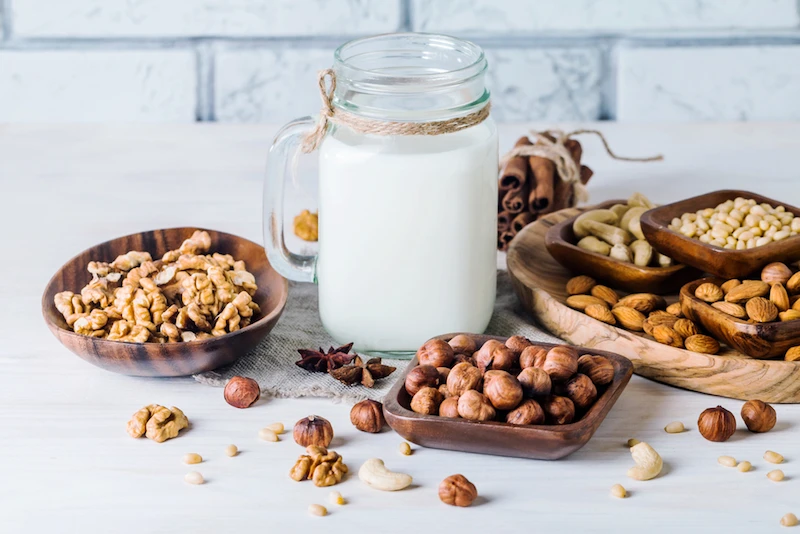
Vegan milk alternatives
There are so many different vegan substitutes for milk on the market!
To ensure you’re getting enough calcium, choose milk varieties that contain at least 300 mg of calcium per 250ml of milk and you may already be reaching 30% of your recommended daily intake (if you are a woman). Keep in mind that some milks don’t contain this much calcium per 250ml. In this case, you may need to either increase your serving size of that milk or make sure you include other foods in your diet that will contribute to your daily calcium target.
These vegan substitutes are suitable for all kinds of recipes such as smoothies, pancakes, chia puddings, muffins, homemade ice cream, cakes or dressings and they can be used anywhere dairy milk is included!
As with dairy-free yoghurts and most milk varieties, one thing to be mindful of with any vegan milk alternatives is the sugar content — try to choose unsweetened versions where possible.
Some options for vegan milk alternatives are:
Soy milk: good for coffee, higher calcium option
Nut milks: such as almond, cashew or macadamia milk
Oat milk
Hemp milk
Coconut milk.
Vegan alternatives to cream
When you’re looking for an alternative to cream in desserts, curries, sauces or soups, you can choose either coconut milk or cashew cream.
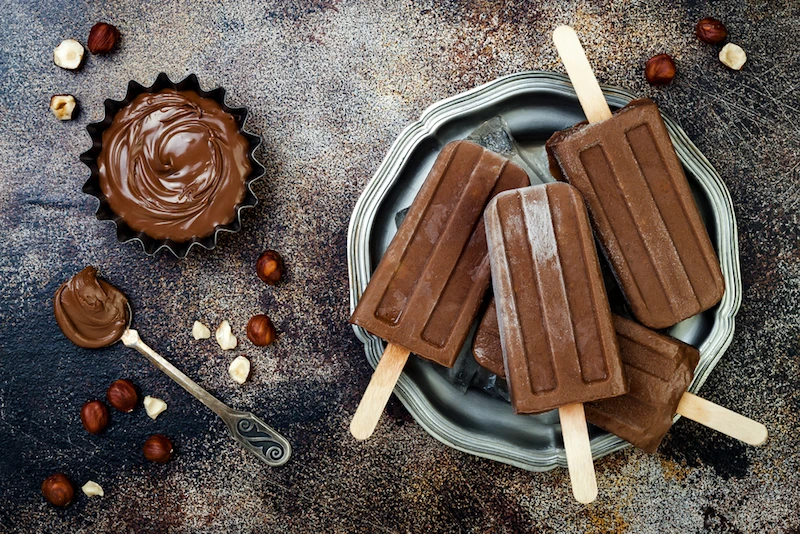
Vegan ice cream alternatives
If you’re a lover of all things ice cream, minus the dairy, there are still plenty of options available for you.
There are a number of dairy-free sorbets and store-bought vegan substitutes for ice creams that are readily available. However, if you’d prefer to avoid any potential hidden nasties that can be found in pre-packaged ice creams, you could also try making your own! Nice cream is a great healthy dessert option that can be made using frozen banana or non-dairy milks.
Blending the frozen bananas or non-dairy milk with fruits, cacao powder, nut butter or whatever flavours you like can also taste delicious.
Find the vegan-friendly substitutes that work for you
Your diet as a whole determines your health — therefore, eating a wide variety of foods will ensure you’re getting all the nutrients you need to feel your best. If you’re new to exploring non-dairy or vegan substitutes, it may involve a little trial and error to begin with before you find what works best for you and your tastebuds. The more prepared and knowledgeable you are though, the easier this process can be — that’s why these handy tips should make a healthy transition to a dairy-free diet a lot easier!
If you have recently transitioned to non-dairy products, or adopted a vegan or even a flexitarian diet, let us know your best tips in the comments below!

A more empowered you starts with Sweat, and our editorial team is here to bring you the latest fitness tips, trainer recommendations, wellbeing news, nutritional advice, nourishing recipes and free workouts.
* Disclaimer: This blog post is not intended to replace the advice of a medical professional. The above information should not be used to diagnose, treat, or prevent any disease or medical condition. Please consult your doctor before making any changes to your diet, sleep methods, daily activity, or fitness routine. Sweat assumes no responsibility for any personal injury or damage sustained by any recommendations, opinions, or advice given in this article.
Nutrition